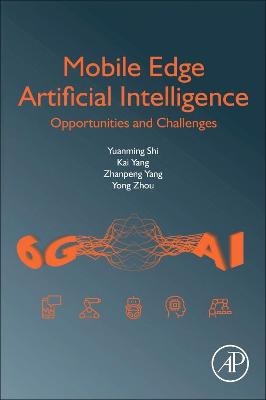
Mobile Edge Artificial Intelligence
Academic Press Inc (Verlag)
978-0-12-823817-2 (ISBN)
As such, intelligent wireless networks will be designed to leverage advanced wireless communications and mobile computing technologies to support AI-enabled applications at various edge mobile devices with limited communication, computation, hardware and energy resources.
Yuanming Shi received the B.S. degree in electronic engineering from Tsinghua University, Beijing, China, in 2011. He received the Ph.D. degree in electronic and computer engineering from The Hong Kong University of Science and Technology (HKUST), in 2015. Since September 2015, he has been with the School of Information Science and Technology in ShanghaiTech University, where he is currently a tenured Associate Professor. He visited University of California, Berkeley, CA, USA, from October 2016 to February 2017. His research areas include optimization, machine learning, wireless communications, and their applications to 6G, IoT, and edge AI. He was a recipient of the 2016 IEEE Marconi Prize Paper Award in Wireless Communications, the 2016 Young Author Best Paper Award by the IEEE Signal Processing Society, and the 2021 IEEE ComSoc Asia-Pacific Outstanding Young Researcher Award. He is also an editor of IEEE Transactions on Wireless Communications, IEEE Journal on Selected Areas in Communications, and Journal of Communications and Information Networks. Mr. Kai Yang is currently at JD.com, Inc., China. His research interests include big data processing, mobile edge/fog computing, mobile edge artificial intelligence and dense communication networking. He has developed a wireless distributed computing framework for edge inference, and an over-the-air computation approach for edge federated machine learning. Mr. Zhanpeng Yang is shortly to join the School of Information Science and Technology, ShanghaiTech University. He mainly focuses on developing reconfigurable intelligence surface based 6G wireless technologies for mobile edge AI systems. Yong Zhou received the B.Sc. and M.Eng. degrees from Shandong University, Jinan, China, in 2008 and 2011, respectively, and the Ph.D. degree from the University of Waterloo, Waterloo, ON, Canada, in 2015. From Nov. 2015 to Jan. 2018, he worked as a postdoctoral research fellow in the Department of Electrical and Computer Engineering, The University of British Columbia, Vancouver, Canada. He is currently an Assistant Professor in the School of Information Science and Technology, ShanghaiTech University, Shanghai, China. He was the track co-chair of IEEE VTC 2020 Fall and 2023 Spring, as well as the general co-chair of IEEE ICC 2022 workshop on edge artificial intelligence for 6G. He co-authored the book Mobile Edge Artificial Intelligence: Opportunities and Challenges (Elsevier 2021). His research interests include 6G communications, edge intelligence, and Internet of Things.
I. Introduction and Overview 1. Primer on Artificial Intelligence 2. Overview of Edge AI Systems
II. Edge Inference 3. Model Compression for On-Device Inference 4. Wireless MapReduce for Device Distributed Inference 5. Wireless Cooperative Transmission for Edge Inference
III. Edge Training 6. Over-the-Air Computation for Federated Learning 7. Blind Over-the-Air Computation for Federated Learning 8. Reconfigurable Intelligent Surface Aided Federated Learning System
IV. Future Directions 9. Communication-Efficient Algorithms for Edge AI 10. Future Research Directions
| Erscheinungsdatum | 24.08.2021 |
|---|---|
| Verlagsort | San Diego |
| Sprache | englisch |
| Maße | 152 x 229 mm |
| Gewicht | 340 g |
| Themenwelt | Informatik ► Theorie / Studium ► Künstliche Intelligenz / Robotik |
| ISBN-10 | 0-12-823817-8 / 0128238178 |
| ISBN-13 | 978-0-12-823817-2 / 9780128238172 |
| Zustand | Neuware |
| Haben Sie eine Frage zum Produkt? |
aus dem Bereich


